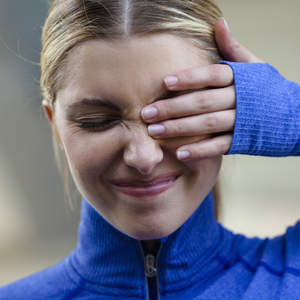A twitch in your eye can be incredibly irritating and distracting. But luckily, eye twitch is usually not painful, and very rarely is it cause for concern. “Basically it’s an overstimulation of the eye muscles,” says Donny Suh, MD, associate professor at the Truhlsen Eye Institute of the University of Nebraska Medical Center in Omaha. This overstimulation results in an involuntary contraction of the muscles, which manifests as that small twitch or tic in your eye. Here, what you need to know about eye twitch, and what you can do to make it go away.
What causes eye twitching
There are a few possible eye twitch causes, and most of them are easily remedied. Two of the most common? Stress and lack of sleep. Too much caffeine, alcohol, or nicotine can also lead to eye twitching.
An eye twitch can also be triggered by dry eye, which can itself be caused by a number of different factors. “It can be [caused by] an autoimmune disease, but more commonly it occurs with aging or medications,” says Dr. Suh. Antihistamines, antidepressants, and nasal decongestants are common culprits.
Eye twitch may also be a symptom of certain eye conditions, including glaucoma, blepharitis (an inflammation of the eyelids), uveitis (another type of eye inflammation), or a corneal abrasion.
When to see a doctor
“Twitches are typically benign and should only last for a few weeks,” says Dr. Suh, adding that a lingering eye twitch could actually lead to more anxiety, which prevents it from going away. “The problem is that once you develop these twitches, they tend to cause a vicious cycle.”
However, if an eye twitch lingers for a long time, or if you have double vision, a pupil that becomes irregular-looking, or facial contractions outside of the eyelid, Dr. Suh recommends seeing a specialist right away. In very rare cases, eye twitching can be an early sign of a more serious condition, including Bell’s palsy, multiple sclerosis (MS), or Tourette syndrome.
Lifestyle changes can often remedy an eye twitch, but it’s helpful to pinpoint the exact cause. If you suspect that stress or fatigue is to blame, make sure you get plenty of shut-eye, practice good sleep hygiene, and try relaxation techniques (such as meditation or yoga). Limiting your consumption of caffeine and alcohol (or abstaining completely) could also make a difference. If the twitch is related to dry eye, over-the-counter artificial tears may help ease symptoms.
Dr. Suh also stresses the importance of limiting the amount of time you spend looking at electronic screens. He recommends giving your eyes a rest every 10 minutes. To relax the eye muscles, close your eyes briefly, then look at a distant object. You should take similar breaks when reading books, or any time you’re focusing your eyes intensely.
“This would just take 10 to 15 seconds, so having no time is not a good excuse,” says Dr. Suh.












